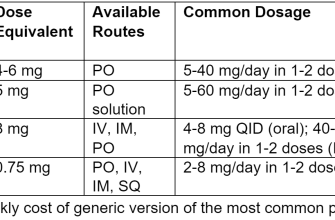Regular Viagra use requires careful consideration. Consult your doctor for personalized advice, especially if you’re considering long-term use. They can assess your overall health and discuss potential risks and benefits specific to your situation. Open communication is key.
Long-term Viagra use isn’t for everyone. Factors like heart health, pre-existing conditions, and other medications influence its suitability. Your doctor will conduct a thorough examination and review your medical history before recommending a treatment plan. This ensures your safety and efficacy.
Potential long-term side effects warrant attention. While common short-term effects like headaches and flushing can subside, others might persist. Regular check-ups are recommended to monitor your health while on Viagra. Be proactive in reporting any concerns to your physician.
Explore alternative treatments with your doctor if long-term Viagra isn’t advisable. They might suggest lifestyle changes, other medications, or therapies. Remember, many options exist for addressing erectile dysfunction, and finding the right one involves collaboration with your healthcare provider.
Remember: This information is for general knowledge and shouldn’t substitute professional medical guidance. Always seek advice from your doctor before starting or continuing any medication, especially for extended periods.
- Viagra Long Term: Understanding the Implications
- Viagra’s Intended Use and Short-Term Effects
- Common Short-Term Effects
- Important Considerations
- Long-Term Effects on Erectile Function: Benefits and Limitations
- Potential Side Effects of Long-Term Viagra Use
- Interactions with Other Medications: Things to Consider
- Alpha-Blockers and Other Blood Pressure Medications
- Cardiovascular Risks Associated with Prolonged Viagra Use
- Understanding the Risks
- Monitoring Your Health
- Alternative Treatments
- Alternatives to Long-Term Viagra for Erectile Dysfunction
- Consulting a Doctor: When to Seek Professional Advice
- Side Effects Requiring Medical Attention
Viagra Long Term: Understanding the Implications
Consult your doctor before considering long-term Viagra use. Regular check-ups are key to monitoring your health and managing potential side effects.
Long-term Viagra use might increase your risk of certain side effects. These include:
- Hearing loss
- Vision problems
- Heart problems
- Headaches
- Indigestion
The severity of these side effects varies greatly depending on individual factors like age, overall health, and dosage. Your doctor can help assess your risk.
Here’s what you should discuss with your doctor:
- Your medical history, including any heart conditions, vision problems, or hearing loss.
- Any other medications you’re taking, as interactions are possible.
- Your lifestyle choices, such as diet and exercise, to ensure holistic health management.
- Your expectations for long-term Viagra use and potential alternatives.
Remember, Viagra is not a cure for erectile dysfunction; it’s a treatment. Your doctor may explore alternative treatment options if needed or recommend lifestyle adjustments to address underlying issues contributing to erectile dysfunction. Regular monitoring allows for timely adjustments to your treatment plan, ensuring your safety and well-being.
Open communication with your healthcare provider is crucial for safe and informed long-term management of erectile dysfunction.
Viagra’s Intended Use and Short-Term Effects
Viagra, containing sildenafil citrate, treats erectile dysfunction (ED) in men. It works by increasing blood flow to the penis, facilitating an erection. This effect is typically seen within 30-60 minutes of taking the medication, though onset can vary based on individual factors like food consumption and overall health.
Common Short-Term Effects
While Viagra effectively addresses ED, some common short-term side effects include headache, flushing, nasal congestion, and visual disturbances like blurred vision or sensitivity to light. These are usually mild and temporary. Less frequent side effects include indigestion, dizziness, and muscle aches. The frequency and intensity of these side effects vary from person to person.
Important Considerations
It’s crucial to follow your doctor’s instructions precisely regarding dosage and frequency. Do not exceed the recommended dose. Alcohol consumption can affect Viagra’s effectiveness and may increase the likelihood of experiencing side effects. Inform your doctor about all medications you are taking, including prescription and over-the-counter drugs, before starting Viagra. Severe side effects, such as prolonged erection (priapism) or sudden vision loss, require immediate medical attention.
Long-Term Effects on Erectile Function: Benefits and Limitations
For many men, Viagra offers sustained improvement in erectile function. Consistent use can lead to greater confidence and improved sexual relationships. However, long-term use isn’t without potential drawbacks.
One key benefit is the potential for improved overall sexual satisfaction, leading to stronger intimacy. Regular use can help men maintain healthy sexual function, even as they age. This consistent improvement contributes positively to their well-being.
| Benefit | Limitation |
|---|---|
| Improved sexual confidence and satisfaction | Potential for side effects, such as headaches, flushing, or nasal congestion. |
| Maintenance of erectile function with aging | Possible development of tolerance requiring dosage adjustments or alternative treatments. |
| Enhanced intimacy and relationship satisfaction | Cost of long-term medication can be a concern for some. |
Remember, individual responses vary. Consult your doctor to discuss potential risks and benefits, considering your medical history and overall health. They can guide you toward the best course of action, possibly including alternative therapies if needed.
Regular monitoring of blood pressure and heart health is advisable for men on long-term Viagra. Open communication with your healthcare provider is critical for managing any potential issues and optimizing treatment.
Potential Side Effects of Long-Term Viagra Use
Consult your doctor before starting or continuing long-term Viagra use. Prolonged use can increase the risk of certain side effects.
Heart-related issues: Increased risk of heart attack, stroke, and irregular heartbeat are possibilities. Men with pre-existing heart conditions should exercise extreme caution.
Vision problems: Temporary vision changes, such as blurred vision or changes in color perception, are common. However, persistent or worsening vision problems necessitate immediate medical attention.
Hearing difficulties: In rare cases, prolonged Viagra use has been associated with hearing loss or tinnitus (ringing in the ears). Report any changes in hearing promptly.
Headaches: While common with initial use, persistent or severe headaches during long-term use warrant discussion with your physician.
Nasal congestion: Stuffiness or runny nose can occur. This typically lessens over time, but persistent congestion should be reported.
Gastrointestinal problems: Some men experience indigestion, nausea, or diarrhea. Dietary adjustments might help, but persistent symptoms require medical assessment.
Remember: This information is not exhaustive. Your doctor can provide personalized advice based on your health history and individual needs. Open communication with your healthcare provider is paramount for safe and effective medication management.
Interactions with Other Medications: Things to Consider
Always inform your doctor about all medications you’re taking, including over-the-counter drugs, supplements, and herbal remedies. This includes nitrates, often prescribed for chest pain. Combining Viagra with nitrates can cause a dangerous drop in blood pressure.
Alpha-Blockers and Other Blood Pressure Medications
Viagra can interact with alpha-blockers, used to treat high blood pressure and enlarged prostate. This combination may lead to significantly lower blood pressure. Your doctor should carefully monitor your blood pressure if you’re using both. Similar caution is advised with other blood pressure medications; discuss potential interactions with your physician.
Certain antifungal medications, like ketoconazole and itraconazole, can increase Viagra’s levels in your blood, potentially raising the risk of side effects. Likewise, protease inhibitors, used to treat HIV, can also interact with Viagra. Open communication with your prescribing doctor is paramount to managing these potential interactions.
If you experience any unusual side effects while taking Viagra, contact your doctor immediately. Regular check-ups with your physician are important, especially when combining Viagra with other medications.
Cardiovascular Risks Associated with Prolonged Viagra Use
Prolonged Viagra use, exceeding recommended dosages or duration, increases your risk of cardiovascular events. Consult your doctor before starting or continuing long-term use.
Understanding the Risks
Viagra (sildenafil) relaxes blood vessels, potentially lowering blood pressure. This effect, beneficial for erectile dysfunction, can be problematic for individuals with pre-existing heart conditions. Studies show increased risk of heart attack, stroke, and irregular heartbeat in patients using Viagra long-term, especially those with underlying cardiovascular disease or risk factors like high blood pressure, high cholesterol, or diabetes. The risk is amplified with higher doses and concurrent use of nitrates.
Monitoring Your Health
Regular checkups with your physician are crucial. Open communication about any cardiovascular symptoms, such as chest pain, shortness of breath, or dizziness, is vital. Your doctor can monitor your blood pressure and perform necessary tests to assess your cardiovascular health and adjust your Viagra dosage or treatment plan accordingly.
| Risk Factor | Increased Risk with Prolonged Viagra Use |
|---|---|
| Pre-existing heart disease | Heart attack, stroke, irregular heartbeat |
| High blood pressure | Hypertensive crisis |
| High cholesterol | Increased risk of atherosclerosis |
| Diabetes | Increased risk of cardiovascular complications |
| Nitrate use | Severe hypotension |
Alternative Treatments
If cardiovascular risks outweigh benefits, your physician may suggest alternative treatments for erectile dysfunction. These may include lifestyle changes, other medications, or penile implants. Discuss these options to find the safest and most effective approach for your individual circumstances. Remember, prioritizing your cardiovascular health is paramount.
Alternatives to Long-Term Viagra for Erectile Dysfunction
Consider lifestyle changes first. Regular exercise, a balanced diet, and stress management techniques like yoga or meditation often improve erectile function. Losing weight, if needed, can significantly help.
Consult your doctor about other medications. PDE-5 inhibitors like Cialis or Levitra might be better suited for long-term use than Viagra, offering varying durations of effect. They may also suggest alternative treatments based on your specific health profile.
- Hormone therapy: Testosterone replacement therapy can be beneficial for men with low testosterone levels contributing to ED.
- Vacuum erection devices: These devices help achieve an erection mechanically and can be used independently or in conjunction with other therapies.
- Penile injections: These injections directly into the penis use medications to create an erection; discuss potential side effects and suitability with your doctor.
- Penile implants: This surgical option involves inserting implants to create a permanent erection; it’s a more invasive solution for severe cases.
Explore alternative therapies alongside medical intervention. Some men find acupuncture or psychological counseling helpful in addressing underlying anxiety or relationship issues contributing to ED.
- Schedule a thorough medical examination to rule out any underlying health issues contributing to ED.
- Discuss your concerns openly with your doctor; they can guide you toward the best treatment plan for your individual needs and circumstances.
- Be patient and persistent; finding the right solution may take time and experimentation.
Consulting a Doctor: When to Seek Professional Advice
Schedule a doctor’s appointment if you experience chest pain, irregular heartbeat, or vision changes while using Viagra or similar medications. These symptoms require immediate medical attention.
Side Effects Requiring Medical Attention
Seek professional help if you experience prolonged erections (priapism), lasting more than four hours. This is a serious medical condition requiring prompt treatment. Similarly, consult your doctor if you develop sudden hearing loss or experience severe headaches, dizziness, or nausea. These could indicate a serious adverse reaction.
Regular check-ups with your doctor are recommended, especially if you have underlying health conditions like heart disease, high blood pressure, or diabetes. This allows for monitoring of your overall health and medication effectiveness. Openly discuss any concerns about Viagra’s long-term effects with your physician. They can provide tailored advice and address any questions you have.
Don’t hesitate to contact your doctor if you notice any unusual side effects, even if they seem minor. Early intervention can prevent complications. Your doctor can adjust your dosage or recommend alternative treatments if needed.






